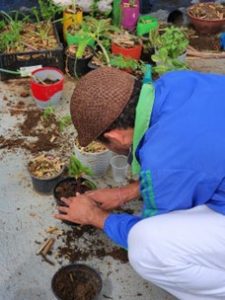Care for Indigenous Communities
Currently, CAPS Parelheiros provides care to the Indigenous population living in protected areas of the region. This care is delivered through the Basic Health Units (UBS), located in the Tenondé Porã Indigenous Territory, in collaboration with the Primary Care teams.
These teams carry out home visits, individual consultations, and therapeutic group sessions, either at the UBS or in open spaces within the villages, on a fortnightly basis. There is also an initiative encouraging Indigenous participation in activities held at the CAPS Parelheiros facility, although integration remains challenging due to the distance and travel difficulties between the reserve and the service.
To ensure more accessible and culturally sensitive care for this population, the CAPS works with Indigenous Community Health Agents, who play a crucial role in mobilising the community for mental health support. In addition to facilitating access to services, these agents act as translators between Guarani and Portuguese, enabling clearer and more effective communication between health professionals and service users.
Although the therapeutic approach follows the same principles applied to the general population, it is essential to respect cultural particularities to ensure the treatment is effective and considers each individual’s beliefs, challenges, and identity. In Indigenous culture, mental health and spirituality are deeply interconnected. As such, alongside medical treatments and the use of medication when necessary, it is common for Indigenous people to seek support from the pajé — the spiritual leader of the village — and to attend prayer houses as part of the healing process.
This relationship between traditional healing and mental health care was clearly demonstrated in a recent case. An Indigenous patient, experiencing a deterioration in her mental health, was referred for more intensive treatment at CAPS Parelheiros, which included the option of staying at the unit for a few days for closer monitoring — an experience that was entirely new to her. However, before making a decision, she chose to temporarily step away to undergo healing rituals with the pajé.
Initially, her absence caused concern among health professionals, who were unable to reach her for several days. However, when she returned to CAPS, she showed significant improvement in her symptoms, highlighting the importance of spirituality in her therapeutic process. Over time, it became clear that understanding and respecting cultural differences is essential to delivering more comprehensive and humanised care.
In this way, CAPS Parelheiros has not only sought to incorporate traditional Guarani knowledge into the context of mental health care, but also to strengthen its presence within the territory, building relationships and the trust necessary for truly welcoming and effective support.
The work carried out by CAPS Parelheiros is a clear example of how psychological and social care can be humanised, tailored to local needs, and capable of improving the quality of life of those who need it most. Receiving the right treatment transforms lives and helps build a society that is increasingly aware of the importance of mental health to overall wellbeing.
The work of the CAPS (Psychosocial Care Centre) in regions of social vulnerability such as Parelheiros is crucial to ensuring access to mental health care for populations that would otherwise struggle to receive appropriate support. In these areas, poor infrastructure, a shortage of public services, and socioeconomic barriers make it harder for individuals to seek help, worsening cases of anxiety, depression, and other psychological disorders. The CAPS serves as a vital point of care, offering continuous, humanised treatment that is attuned to the local reality, reducing the need for long journeys and improving users’ quality of life.
Beyond clinical care, the impact of the CAPS extends to the broader community. The centre promotes therapeutic activities and psychosocial rehabilitation efforts, strengthening social and family bonds, encouraging users’ reintegration into society, and combating the stigma surrounding mental illness. In this way, the CAPS not only provides treatment but also helps prevent the worsening of mental health conditions, contributing to the development of a more inclusive society that is aware of the importance of mental health.




